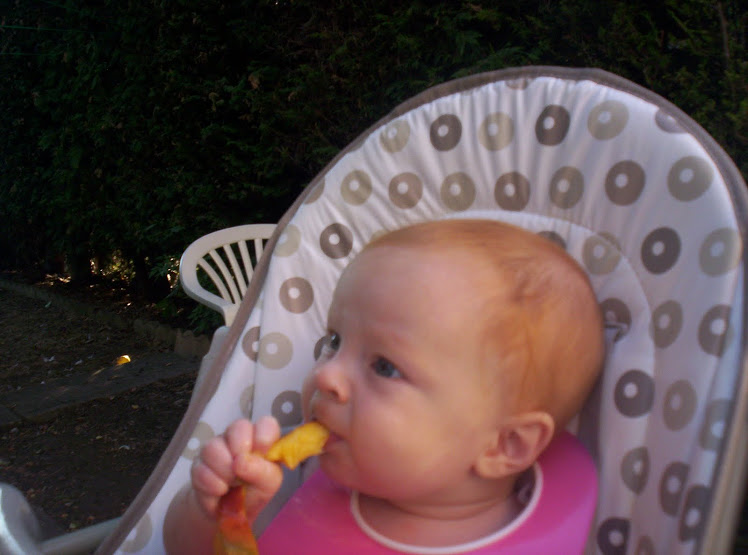Feeding Ethan Bear has meant I have developed a keen interest in nutrition. So I thought I would find out about all the things we need to make our bodies work and compile it in one place. It makes the thought of him getting all the stuff he needs seem a little less scary. I choose not to give him vitamin drops as I believe he can get everything he needs from a healthy diet and trust him to choose the right foods when he needs them. I have never really been a big fan of popping vitamin pills as the science is debatable on whether non-dietary sources of a lot of things achieve the same result. So I remain a sceptic and Ethan Bear seems just fine.
Macronutrients
Carbohydrates provide energy for the body = starchy foods like bread, rice, pasta, potatoes, cereals, starchy vegetables (like parsnips), milk and milk products, sugar, preserves and confectionary.
Protein provides amino acids which are building blocks needed for growth and repair plus energy = meat, fish, eggs, dairy foods, cereal products like bread, soya, nuts and pulses.
Fat provides essential fatty acids that the body can't produce but need in small amounts to allow cells to obtain nutrition and expel harmful waste products. Babies need efas for brain development and to mature the senses = fats, oils, meat and meat products, oily fish, dairy foods, nuts, chocolate, cakes, biscuits, pastry products, crisps and other snacks.
Micronutrients
Water soluble nutrients that cannot be stored in the body.
Vitamin B1 or thiamin - needed to release energy from carbs it is also important for heart and nervous system to function. Found in wholegrains, nuts, meat (especially pork), fruit and vegetables.
Vitamin B2 or riboflavin - releases energy from carbs, protein and fat as well as transport and metabolism of iron and is needed for skin to be healthy. Found in milk, eggs, rice, liver, beans, lentils, peanuts, peas, mushrooms and green vegetables.
Vitamin B3 or niacin - involved in use of protein and helps haemoglobin to form and carry oxygen around the body. Found in poultry, white fish, milk, eggs, whole grains, soya beans, peanuts and some veg.
Vitamin B12 - used in making of red blood cells, important for keeping the nervous system ticking and releases energy from food. Found in meat, fish, milk, eggs, and marmite.
Folate (or in tablet form folic acid) - needed for formation of healthy red blood cells and nervous system (especially in nervous system formation of unborn babies. Found in green leafy veg, brown rice, peas, oranges and bananas.
Vitamin C - an antioxidant (which help protect your body from damage by free radicals) and important for normal structure and functioning of body tissues and helps absorption of iron from vegetarian sources and helps the healing process. Found in fresh fruits (esp. citrus and berries), green veg, peppers, tomatoes and potatoes (esp new).
Vitamin D - important for the normal structure and functioning of the skin and body linings, e.g. in lungs and keeps immune system healthy. Found in liver, whole milk, cheese, butter, margarine, carrots, dark green leafy vegtables and orange-coloured fruits, e.g. mangoes and apricots.
Vitamin E - antioxident and protects skin against damage. Found in vegetable oils, nuts and seeds.
Vitamin K- vital for normal clotting of blood and is required for normal bone structure. Found in green leafy vegetables, meat and dairy products.
Minerals
Calcium - important for healthy bones and teeth plus functioning of neves and muscle. Found in milk, cheese and other dairy products, some green leafy vegetables such as broccoli.
Fluroide - helps with the formation of strong teeth and protects against dental decay (caries). Found in fluoridated water, tea, fish and toothpaste.
Iodine - needed to make thyroid hormones, which control many metabolic processes, and keep our bodies healthy. Found in milk, sea fish, shellfish, seaweed.
Iron - required for making red blood cells, which transport oxygen around the body. Also needed for normal metabolism and the functioning of enzymes that remove unwanted substances from the body. Found in liver, red meat, pulses, nuts, eggs, dried fruits, poultry, fish, whole grains and dark green leafy vegetables.
Phosphorous - needed for the formation of healthy bones and teeth, and for the use of energy from food. Found in red meat, dairy products, fish, poultry, bread, rice and oats.
Potassium - helps maintain a healthy blood pressure. It is also involved in the normal functioning of nerves. Found in fruit (esp bananas), meat, shellfish, veg, milk, nuts, seeds.pulses.
Selenium - important component of the body’s defence system that protects our bodies against damage. It is also necessary for the use of iodine in thyroid hormone production, as well as the normal functioning of the reproductive system. Found in brazil nuts, bread, fish, meat and eggs.
Zinc - required for the use of carbohydrate, protein and fat. Needed for cell division, growth and tissue repair. Also necessary for normal reproductive development, the immune system and healing of wounds. Found in meat, milk, cheese, eggs, shellfish, wholegrain cereals, nuts and pulses.
Two other very imporant components of a healthy diet...
Water - essential for our bodies to work correctly. Breastfed babies get all the water they need from breastmilk (it is 88 percent water and baby can control whether they are getting mainly watery or fatty milk from the length they choose to feed) even during the weaning period so although you can offer water from a cup you don't need to worry too much about baby taking it. Formula fed babies should be offered water regularly.
Fibre - needed for movement of waste products and to prevent constipation. Found in cereals, beans, pulses, lentils, fruit and vegetables.

No comments:
Post a Comment